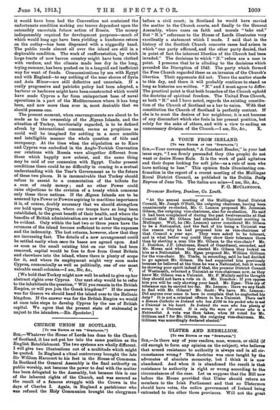CHURCH UNION IN SCOTLAND.
[To THE EDITOR 07 THE " SPECTATOR."]
SIR,—Whatever the House of Lords has done to the Church of Scotland, it has not put her into the same position as the English Establishment. The two systems are wholly different. I will give two illustrations out of a multitude which might be quoted. In England a ritual controversy brought the late Sir William Harcourt to his feet in the House of Commons. In Scotland the General Assembly is the final authority on public worship, not because the power to deal with the matter has been delegated to the Assembly, but because this is one of the inherent rights of the Church, and was secured as the result of a famous struggle with the Crown in the days of Charles I. Again, in England a parishioner who was refused the Holy Communion brought the clergyman before a civil court; in Scotland he would have carried the matter to the Church courts, and finally to the General Assembly, where cases on faith and morals " take end." But " N.'s " reference to the House of Lords illustrates very excellently a statement which I made. I said that in the history of the Scottish Church concrete cases had arisen in which "one party affirmed, and the other party denied, that in point of fact the inherent liberties of the Church had been invaded." The decisions to which " N." refers are a case in point. I presume that he is alluding to the decisions which preceded the Disruption of 1843. The party which formed the Free Church regarded these as an invasion of the Church's liberties. Their opponents did not. There the matter stands to this day, and there it will probably continue to stand as long as histories are written. " N." and I must agree to differ. The practical point is that both branches of the Church uphold the doctrine of spiritual freedom. The United Free Church, as both " N." and I have noted, regards the existing constitu- tion of the Church of Scotland as a bar to union. With that constitution the Church of Scotland is perfectly content. If she is to meet the desires of her neighbour, it is not because of any discomfort which she feels in her present position, but solely for the sake of others, and with a view to ending an unnecessary division of the Church.—I am, Sir, &c., X.














































 Previous page
Previous page